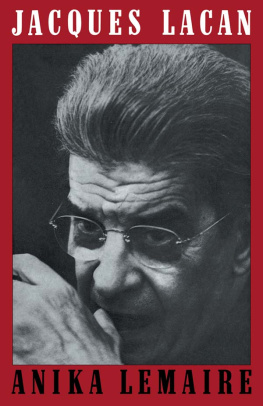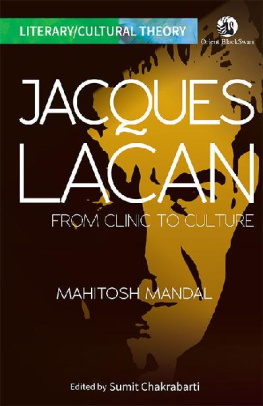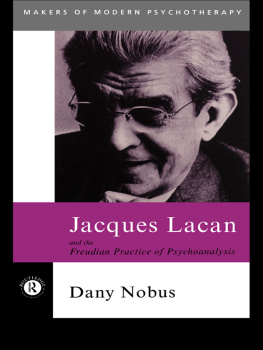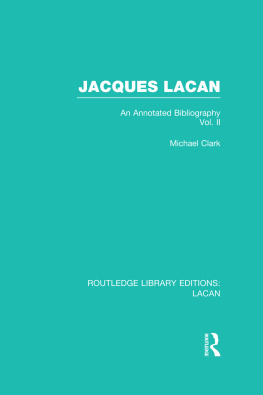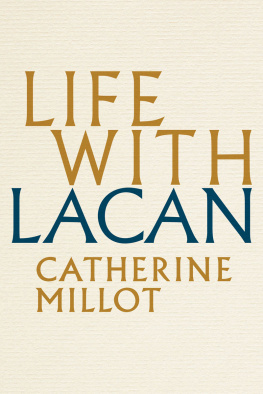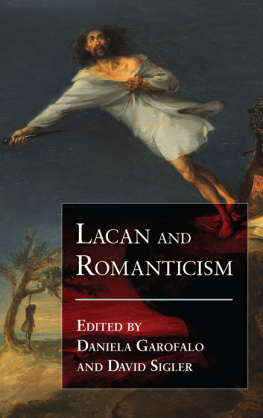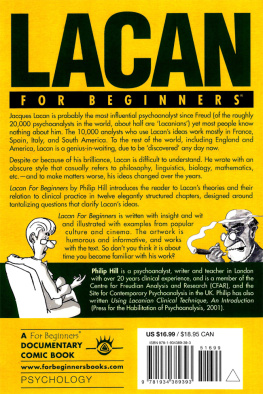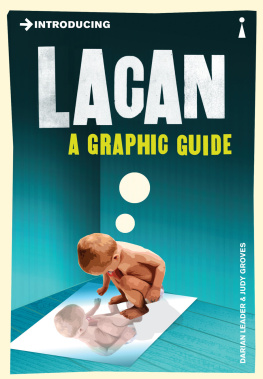Lemaire Anika - Jacques Lacan
Here you can read online Lemaire Anika - Jacques Lacan full text of the book (entire story) in english for free. Download pdf and epub, get meaning, cover and reviews about this ebook. year: 1979, publisher: Taylor & Francis Ltd, genre: Detective and thriller. Description of the work, (preface) as well as reviews are available. Best literature library LitArk.com created for fans of good reading and offers a wide selection of genres:
Romance novel
Science fiction
Adventure
Detective
Science
History
Home and family
Prose
Art
Politics
Computer
Non-fiction
Religion
Business
Children
Humor
Choose a favorite category and find really read worthwhile books. Enjoy immersion in the world of imagination, feel the emotions of the characters or learn something new for yourself, make an fascinating discovery.
- Book:Jacques Lacan
- Author:
- Publisher:Taylor & Francis Ltd
- Genre:
- Year:1979
- Rating:3 / 5
- Favourites:Add to favourites
- Your mark:
- 60
- 1
- 2
- 3
- 4
- 5
Jacques Lacan: summary, description and annotation
We offer to read an annotation, description, summary or preface (depends on what the author of the book "Jacques Lacan" wrote himself). If you haven't found the necessary information about the book — write in the comments, we will try to find it.
Jacques Lacan — read online for free the complete book (whole text) full work
Below is the text of the book, divided by pages. System saving the place of the last page read, allows you to conveniently read the book "Jacques Lacan" online for free, without having to search again every time where you left off. Put a bookmark, and you can go to the page where you finished reading at any time.
Font size:
Interval:
Bookmark:
Anika Lemaire
Jacques Lacan
Translated by David Macey

Originally published in Belgium in 1970
by Charles Denart
This edition revised by the author and translated by David Macey
first published in 1977
by Routledge & Kegan Paul Ltd
Reprinted and first published as
a paperback in 1979
Reprinted in 1980, 1981, 1982, 1986
Reprinted 1991, 1994, 1996
by Routledge
27 Church Road, Hove, East Sussex, BN3 2FA
270 Madison Ave, New York NY 70076
Transferred to Digital Printing 2070
Set in Monotype Imprint 101 by
Kelly Typesetting, Bradford-on-Avon, Wiltshire
Charles Denart, Bruxelles 1970
English translationRoutledge & Kegan Paul Ltd 1977
Routledge is an imprint of the Taylor & Francis Group, an informa business
No part of this book may be reproduced in
any form without permission from the
publisher, except for the quotation of brief
passages in criticism
British Library Cataloguing in Publication Data
Lemaire, A
Jacques Laean.
1. Laean, Jacques 2. Psychoanalysis
3. LanguagesPsychology
I. Macey, David
150.195 BF173.L15 7730106
ISBN 978-0-475-07844-3
Publishers Note
The publisher has gone to great lengths to ensure the quality of this reprint but points out that some imperfections in the original may be apparent.
Part One
Some elements and some problems of general linguistics
Part Two
Lacans use of the general data of linguistics
Part Three
The constitution of the subject by accession to the symbolic the Spaltung the role of the Oedipus in this transition
Part Four
The engendering of the unconscious by primal repression (or accession to language) in accordance with the process of metaphor
Part Five
The elementary signifiers constituting the unconscious
Part Six
The transition from lack to desire and to demand
Part Seven
The mechanisms of the formations of the unconscious: structure and organization of the unconscious signifying network
Part Eight
The general conception of the cure in Lacan
Part Nine
The Lacanian conception of neurosis and psychosis
A good thirteen years ago, I used to say to two of those people we call nonentities, which for public opinion, or at least for student opinion, simply better entitles them to occupy the professors place, Dont forget that one day you will give what I am now writing as the subject for a thesis.
As though from a wish that they might look into it: where I would check whether the zero really does have any idea of the place that gives it its importance.
It has happened, then. Nothing has happened to them, only to me: thanks to my crits, I am now the subject of a thesis.
That this should be due to the choice of a young person is nothing new. To my surprise, ten years after its publication my Rome lecture made the adventure of an intellectual emerging into an American university from a trappers tunnel.
As we know, it needs a second swallow to make a summer. The second is therefore unique in this place, even if there are several of them. A smile multiplies when it is that of a young person.
Anthony, Anika what a sign of a new wind is insisting in these initials?
May she forgive me then, if I take the opportunity to designate what she effaces by showing it.
My crits are unsuitable for a thesis, particularly an academic thesis: they are antithetical by nature: one either takes what they formulate or one leaves them.
Each of them is apparently no more than a memorial to the refusal of my discourse by the audience it included: an audience restricted to psychoanalysts.
But, precisely by including them without retaining them, each article shows by a further twist that there is no knowledge without discourse. For what would such knowledge be: the unconscious one imagines is refuted by the unconscious as it is: a knowledge put in the place of truth; this can be conceived only within a structure of discourse.
An unthinkable discourse, because it could only be held if one was ejected from it. Perfectly teachable, however, by a half-speaking: a technique which realizes that truth can only be half-spoken. This presupposes that the psychoanalyst never shows himself except in an asymptomatic discourse, which is, in effect, the least one can expect of him.
In fact, this impossible is the basis of his real; a real from within which the consistency of the discourses in which truth limps can be judged, precisely because it limps openly, as opposed to the inanity of the discourse of knowledge, which, asserting itself with its closure, makes the others lie.
That, indeed, is the operation of academic discourse when it makes a thesis out of the fiction it calls an author, out of the history of thought, or out of something that styles itself progress.
Illustrating an incompatibility such as that in question with an example is always fallacious.
Obviously, it concerns the pupil.
I could draw a contrast and say that, in 1960, my two Ls beat together as two wings (deux ailes), because one of them was such that it had to be taken universally or not at all. By that I mean the lichen which unifies the forest for you when the forest has to hide the tree from you.
At that date, it was a question of nothing less than making my teaching understood, my teaching which for seven years had been stated once every eight days in the most eminent site of French psychiatry in an unpublished lesson for those to whom it was particularly addressed: psychiatrists and psychoanalysts, who still leave it to one side.
This singular phenomenon is the doing of segregations, there as elsewhere effects of discourse, but which, to make concrete inferences, here enact promulgations different in origin and date.
First, the segregation of psychiatry in the Faculty of Medicine, where the university structure displays its affinities with the managerial system. This segregation is supported by the fact that psychiatry itself performs the office of social segregation. The result is that psychiatry designates a spare room on the strength of the Universitys liberal funds, those who have a right to this lodging being repressed into the ghetto which was once, and with some reason, known as the asylum.
Such a site lends itself to the exploits of civilization, where the fact of the prince (my friend Henri Ey, as it happens) is established.
A liberal diktat may arise there, as it may wherever the arbitrary finds itself a crack between domains of necessity.
What happens to me in my field because of Bonneval, the fief of Henri Ey, proceeds, therefore, from no other favour, from no dialectical progress.
If one thinks about it, the field of the psychoanalyst, the habitat he found in psychiatry, is motivated by a political configuration rather than by any connexion of practice. He was ordered there by his antipathy to academic discourse, an antipathy which is no less effective for having received its rationale from my teaching alone, when, as a symptom, it is translated into institutions conveying secondary benefits.
As for the segregational articulation of the psychoanalytic institution, it suffices to recall that the privilege of entering it after the war was to be measured against the fact that, some years earlier, all the analysts in Central Europe had fled to the Atlantic countries and then the batch who would perhaps have to be restricted by a
Font size:
Interval:
Bookmark:
Similar books «Jacques Lacan»
Look at similar books to Jacques Lacan. We have selected literature similar in name and meaning in the hope of providing readers with more options to find new, interesting, not yet read works.
Discussion, reviews of the book Jacques Lacan and just readers' own opinions. Leave your comments, write what you think about the work, its meaning or the main characters. Specify what exactly you liked and what you didn't like, and why you think so.

